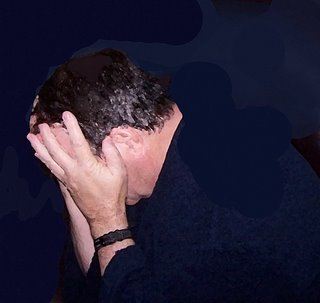
Sunday, a friend of mine asked me how I had been feeling. When I told him that I had been doing much better for the last two months, he said, "I can't imagine what it would be like to be depressed all of the time."
That's a good thing. I wish that no one ever experienced those feelings. The truth is, though, that some do. One in five people will have to deal with major clinical depression. Unfortunately, many of those persons and those who are close to them will never know that they are depressed. Consequently, they will go untreated, and may suffer needlessly for many years.
Not all depression is treatable. That has been my experience. I, like some others, have treatment-resistent depression. That's another problem altogether.
Abraham Lincoln once wrote, "I am now the most miserable man living. If what I feel were equally distributed to the whole human family, there would not be one cheerful face on the earth. Whether I shall ever be better I can not tell; I awfully forbode I shall not. To remain as I am is impossible; I must die or be better, it appears to me." Neither he nor I would wish this condition on our worst enemies.
Before anyone can be treated, they must first be diagnosed. A preliminary diagnosis can sometimes be done personally. If you or anyone you know has the symptoms of depression, then get to a doctor immediately and tell him/her what the problem is.
Characteristics of Depression
01-Depression is a whole-life illness. It involves your body, mood, thoughts and behavior.
02-You may have problems with thinking clearly, concentration and decision making.
03-You might have short-term memory problems. It's not the same as "senior moments."
04-There can be a loss of motivation and lethargy expressed as procrastination.
05-You lose interest in formally enjoyable activities or hobbies.
06-There may be extreme fatigue, loss of energy and slow body movements.
07-Usually there is either a loss of appetite or a craving for carbohydrates and sweets.
08-You may feel chronic aches and pains or a sense of numbness and insensitivity.
09-You can be anxious, worried or nervous.
10-Self-criticism or criticism of others is typical of depression.
11-Anger or irritability is frequently expressed.
12-Your outlook on life is mostly negative or pessimistic. You feel hopeless and helpless.
13-There is usually a desire to withdraw socially, losing even the enjoyment of the company of people you care about.
14-You may experience a loss of libido.
15-Other signs are: crying, sleepiness, neglect of hygiene, guilt, and loss of self-esteem
Knowledge of this illness is an imperative. It is the first step in treatment. Read everything you can about depression. Then talk to a medical professional.
President Lincoln's hard-won wisdom was expressed in a letter to Mary Speed, written September 27, 1841. He wrote: "A tendency to melancholy...let it be observed, is a misfortune, not a fault."
Don't be an obstacle to someone's recovery. Be tender, understanding, sympathetic and helpful.
["I'm so low I could do a ten minute free-fall off the edge of a dime."]